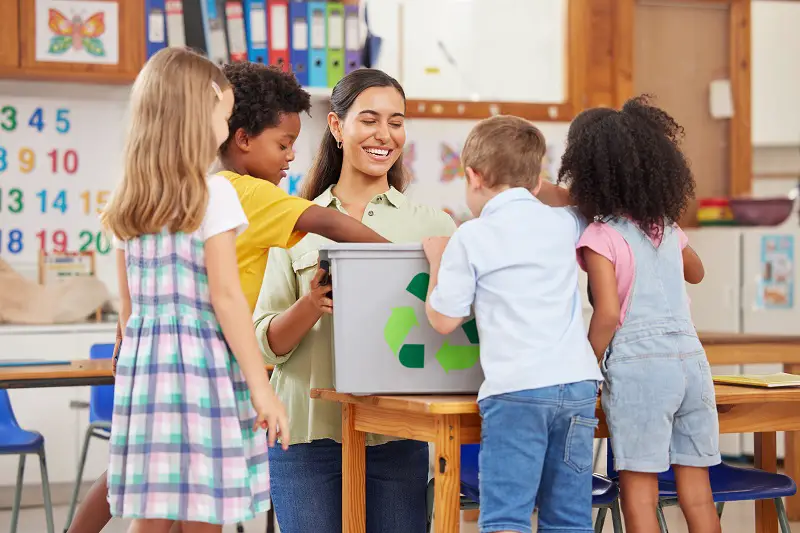Play-based learning is an incredible method of education that has a profound impact on the development of preschool-aged children. By placing play at the center of learning, children are given the opportunity to explore, experiment, and engage in hands-on activities that promote their cognitive, social, emotional, and physical growth.
Research has shown that play-based learning enhances problem-solving skills, creativity, critical thinking, and communication abilities. It also helps children develop a positive attitude towards learning and instills a love for it from an early age. This approach has been widely adopted in early childhood education programs and has proven to be highly effective in shaping preschool development.
Benefits of Play-Based Learning in Preschool
Play-based learning offers numerous benefits for preschoolers. This approach focuses on using play as the central focus for learning and development. By engaging in hands-on activities, children have the opportunity to explore, experiment, and develop essential skills in a fun and engaging way. Here are some of the key benefits of play-based learning:
- Promotes creativity and imagination: Play-based learning encourages children to use their imagination and engage in pretend play. This helps foster creativity and allows children to think outside the box.
- Enhances social skills: Through play, children learn how to cooperate, take turns, and solve problems together. It provides valuable opportunities for social interaction and the development of important social skills.
- Develops fine motor skills: Play-based learning often involves hands-on exploration, which helps develop fine motor skills and coordination. Activities like building with blocks or manipulating playdough can strengthen these skills.
- Fosters cognitive development: Play-based learning engages children in problem-solving activities, critical thinking, and language development. It helps children develop their cognitive abilities and prepares them for future academic success.
“Play-based learning allows children to learn and grow in a way that is enjoyable and meaningful to them.”
Overall, play-based learning in preschool provides a holistic approach to education by incorporating play into the learning process. It not only helps children develop important skills and knowledge but also instills a positive attitude towards learning from an early age. By creating a playful and engaging environment, play-based learning sets the foundation for a lifelong love of learning.
| Benefits of Play-Based Learning in Preschool |
|---|
| Promotes creativity and imagination |
| Enhances social skills |
| Develops fine motor skills |
| Fosters cognitive development |
Play-Based Learning Activities for Preschoolers
Play-based learning activities are a fun and effective way to promote the development of preschoolers. These activities engage children in hands-on exploration and foster their cognitive, social, emotional, and physical skills. Here are some popular play-based learning strategies that can be implemented in preschool settings:
Sensory Play:
Sensory play involves activities that stimulate children’s senses, such as playing with sand, water, or playdough. These activities promote tactile exploration, stimulate creativity, and enhance sensory development.
Dramatic Play:
Dramatic play, also known as pretend play or role-playing, encourages imagination, creativity, and language development. Through pretending to be different characters or engaging in make-believe scenarios, children develop their communication skills and learn how to express themselves.
Building Activities:
Building activities with blocks or construction materials help develop problem-solving skills, spatial awareness, and fine motor skills. Children learn how to plan, design, and construct while developing their creativity and critical thinking abilities.
Nature Exploration and Art Activities:
Exploring nature, engaging in outdoor play, and participating in art activities stimulate children’s curiosity, encourage exploration, and promote creativity. These activities provide opportunities for self-expression, observation of the natural world, and the development of fine motor skills.
By implementing these play-based learning activities, preschoolers can learn and grow in a fun and engaging way. These strategies provide rich opportunities for children to develop their cognitive, social, emotional, and physical skills, setting a strong foundation for their overall development and future academic success.
| Activity | Benefits |
|---|---|
| Sensory Play | – Stimulates creativity |
| – Enhances sensory development | |
| Dramatic Play | – Encourages imagination |
| – Develops communication skills | |
| Building Activities | – Enhances problem-solving skills |
| – Develops spatial awareness | |
| Nature Exploration | – Stimulates curiosity |
| – Promotes creativity | |
| Art Activities | – Encourages self-expression |
| – Develops fine motor skills |
The Importance of Play in Learning
Play is a fundamental aspect of learning for preschool-aged children. It is through play that children make sense of the world around them, experiment with different ideas, and learn from their experiences. Play-based learning approaches recognize the significance of play in fostering holistic development and have incorporated play as a central component of the preschool curriculum.
Play promotes cognitive development by engaging children in problem-solving, critical thinking, and decision-making during play activities. It also enhances social and emotional development as children develop empathy, communication skills, and learn how to interact with others. Play-based learning provides a safe and supportive environment where children can express themselves, explore different roles, and develop a sense of identity.
Furthermore, play-based learning is essential for the development of fine and gross motor skills. Through play activities, children develop coordination, balance, and dexterity. They also engage in sensory exploration, movement, and physical exercise, which are crucial for their overall health and well-being.
By embracing play-based learning, preschoolers not only acquire essential skills and knowledge, but they also develop a love of learning and a positive attitude towards education. Play-based learning creates a dynamic and engaging learning environment that allows children to explore, experiment, and discover at their own pace.
Table: Summary of the Importance of Play in Learning
| Domain | Key Benefits |
|---|---|
| Cognitive Development | Engages children in problem-solving, critical thinking, and decision-making |
| Social and Emotional Development | Promotes empathy, communication skills, and positive relationships |
| Physical Development | Develops coordination, balance, and motor skills |
| Love of Learning | Creates a positive attitude towards education and a lifelong love of learning |
Play-Based Learning in Early Childhood Education
Play-based learning is an integral part of early childhood education, recognized for its effectiveness in promoting preschool development. It aligns with the belief that young children learn best through play, fostering a holistic approach to learning that encompasses cognitive, social-emotional, language, and physical skills. By incorporating play into the classroom, educators create an engaging and nurturing environment that supports children’s growth across all domains.
The Benefits of Play-Based Learning in Early Childhood Education
- Encourages active engagement and self-regulation
- Develops problem-solving and critical thinking skills
- Promotes creativity, imagination, and communication
- Fosters social skills, cooperation, and empathy
- Enhances fine and gross motor skills
Play-based learning provides a balance of structured and unstructured activities, allowing children to explore, experiment, and discover at their own pace. It creates a positive and stimulating environment that encourages curiosity, creativity, and a love for learning.
Through play, children naturally develop essential skills and knowledge while having fun. They engage in hands-on activities, such as sensory play, dramatic play, building with blocks, exploring nature, and participating in art activities. These play-based learning experiences provide rich opportunities for preschoolers to learn and grow, making education an enjoyable and meaningful experience.
Table: Comparing Play-Based Learning with Traditional Teaching Methods
| Play-Based Learning | Traditional Teaching Methods | |
|---|---|---|
| Approach | Child-centered, hands-on, and interactive | Teacher-directed, lecture-style instruction |
| Focus | Whole-child development | Academic knowledge and skills |
| Engagement | Active and self-directed | Passive and teacher-directed |
| Learning Style | Experiential and inquiry-based | Didactic and information-based |
| Skills Developed | Critical thinking, problem-solving, creativity, social-emotional | Academic knowledge and memorization |
| Environment | Nurturing, supportive, and interactive | Structured, formal, and disciplined |
By choosing a play-based learning approach, early childhood educators provide a solid foundation for preschoolers’ future academic success. It ensures that learning is not only effective but also enjoyable, fostering a lifelong love for learning. Through play-based learning, children develop a wide range of skills, gain knowledge, and become confident and curious learners, setting the stage for their ongoing educational journey.
Play-Based Learning in the Classroom
Play-based learning is an integral part of the classroom environment, creating a dynamic and engaging space for preschoolers to learn and grow. In a play-based learning classroom, the physical environment is carefully designed to stimulate curiosity, encourage exploration, and promote active engagement. Different learning areas are set up, allowing children to immerse themselves in various play-based activities that support their development across multiple domains.
Teachers play a crucial role in facilitating play-based learning. They provide a wide range of open-ended materials and resources that spark creativity, problem-solving, and exploration. These materials can include blocks, art supplies, puzzles, dramatic play props, and nature items. By offering a diverse selection, teachers encourage children to choose activities that align with their interests and developmental needs.
During play activities, teachers observe and interact with children, offering guidance, support, and feedback. They use questioning techniques and scaffolding to extend children’s learning, encouraging them to delve deeper into their play experiences. This interaction helps children develop their critical thinking skills, language and communication abilities, and social-emotional competencies.
Benefits of Play-Based Learning in the Classroom:
- Encourages active engagement and self-regulation
- Promotes creativity, problem-solving, and critical thinking
- Fosters language and communication skills
- Develops social skills and collaboration
- Enhances fine and gross motor skills
“Play-based learning in the classroom creates a supportive and stimulating environment for preschoolers.”
| Benefits | Description |
|---|---|
| Active Engagement | Play-based learning keeps children actively engaged in meaningful activities, fostering deep learning experiences. |
| Creativity and Problem-Solving | Through play, children can explore their imaginations, think creatively, and develop problem-solving skills. |
| Language and Communication | Play-based learning provides opportunities for children to practice and enhance their language and communication skills through interactions with peers and teachers. |
| Social Skills and Collaboration | Playing with others allows children to learn social skills such as sharing, taking turns, and collaborating. |
| Fine and Gross Motor Skills | Engaging in play-based learning activities helps children develop both fine and gross motor skills, improving their coordination and physical abilities. |
Play-Based Learning and Math Skills
Mathematics plays a crucial role in a child’s development, and play-based learning offers an engaging and effective way to introduce math skills to preschoolers. Through play activities, children naturally explore mathematical concepts, such as counting, sorting, and shapes. These hands-on experiences not only make learning fun but also provide a solid foundation for future math learning.
One example of play-based learning that promotes math skills is building with blocks. As children construct structures, they learn about spatial relationships, symmetry, and geometric shapes. They also develop problem-solving skills as they figure out how to balance and stabilize their creations. This type of play encourages critical thinking and helps children understand mathematical concepts in a tangible and concrete way.
Another play-based learning activity that strengthens math skills is engaging in cooking or baking activities. While following a recipe, children practice measuring ingredients, estimating quantities, and understanding the concepts of fractions. They also learn about time and sequences as they follow step-by-step instructions. This real-world connection to math helps children see the practical application of mathematical concepts in their daily lives.
The Importance of Play-Based Learning in Early Math Education
Research has shown that play-based learning is highly effective in promoting math skills in preschoolers. It helps children develop a positive attitude towards math by making it enjoyable and engaging. Through play, children gain a deeper understanding of math concepts, as they can see and manipulate objects to explore mathematical ideas. This hands-on approach fosters a solid foundation in math and prepares children for future math learning in elementary school and beyond.
| Benefits of Play-Based Learning in Math Skills Development | Examples of Play-Based Learning Activities for Math Skills |
|---|---|
| Promotes a positive attitude towards mathMakes math learning enjoyable and engagingEncourages critical thinking and problem-solving skillsStrengthens understanding of mathematical conceptsDevelops number sense and spatial reasoning | Building with blocks to explore shapes and symmetryEngaging in cooking or baking activities to practice measurement and fractionsPlaying number games and puzzles to reinforce counting and number recognitionExploring patterns through art and music activitiesUsing manipulatives, such as counting bears or shape tiles, for hands-on exploration |
Play-based learning provides a rich and meaningful context for math learning in preschool. By incorporating math into play activities, children develop a solid foundation in math skills and a positive attitude towards mathematics. Through building, cooking, and other hands-on experiences, children engage in critical thinking, problem-solving, and spatial reasoning. Play-based learning prepares children for future math success and fosters a lifelong love for learning.
Play-Based Learning and Language Development
In preschool, play-based learning plays a crucial role in fostering language development. Through play activities, children have the opportunity to engage in conversations, storytelling, and role-playing, which promote vocabulary development and language skills. Play-based learning creates a natural and meaningful context for children to practice expressing their thoughts and feelings, as well as listening and comprehension skills.
The interactive nature of play-based learning allows children to develop grammar, sentence structure, and expand their knowledge of language. By engaging in pretend play scenarios, children are encouraged to use their imaginations and explore different roles, enhancing their language abilities. Play-based learning also helps children understand the real-world applications of language and develops their problem-solving and critical thinking skills in a fun and engaging way.
The Benefits of Play-Based Learning in Language Development
Play-based learning offers several key benefits for language development in preschool-aged children:
- Enhanced vocabulary: Through play, children are exposed to new words, allowing them to expand their vocabulary and develop a more extensive language repertoire.
- Improved communication skills: Engaging in conversations and storytelling during play activities helps children practice expressing themselves verbally and develop effective communication skills.
- Strengthened listening and comprehension skills: Active engagement in play-based learning activities requires children to listen attentively, follow instructions, and comprehend information, thereby improving their listening and comprehension skills.
- Increased fluency: Regular exposure to language-rich play environments promotes fluency and helps children become more confident and comfortable when speaking.
“Play-based learning creates a natural and meaningful context for language development and helps children become effective communicators.”
Overall, play-based learning provides a supportive and stimulating environment for preschoolers to develop language skills, facilitating effective communication and laying the foundation for future academic success.
| Benefits of Play-Based Learning in Language Development |
|---|
| Enhanced vocabulary |
| Improved communication skills |
| Strengthened listening and comprehension skills |
| Increased fluency |
Play-Based Learning and Cognitive Development
Play-based learning is a powerful tool for promoting cognitive development in preschool-aged children. By engaging in play activities, children have the opportunity to develop various cognitive skills that are essential for their overall growth and future academic success. From problem-solving and critical thinking to memory recall and decision-making, play-based learning offers a holistic approach to fostering cognitive development.
Benefits of Play-Based Learning for Cognitive Development
There are several key benefits of play-based learning that contribute to cognitive development in preschoolers:
- Problem-Solving Skills: Through play, children are encouraged to analyze situations, find solutions, and make decisions, which helps develop their problem-solving abilities.
- Critical Thinking: Play-based learning encourages children to think critically, evaluate different options, and consider consequences, fostering their ability to think strategically.
- Memory Recall: Engaging in play activities stimulates children’s memory recall as they remember rules, patterns, and sequences, enhancing their memory skills.
- Decision-Making: Play-based learning provides opportunities for children to make decisions, assess risks, and take responsibility, nurturing their decision-making skills.
Play-based learning creates a safe and engaging environment where children can explore, experiment, and test their cognitive abilities. It allows children to learn from their experiences and develop a deep understanding of concepts through hands-on and meaningful play activities.
Play-Based Learning Strategies for Cognitive Development
There are various play-based learning strategies that educators and parents can implement to promote cognitive development in preschoolers:
- Open-Ended Play: Providing open-ended materials and allowing children to explore and create without strict guidelines fosters their imagination, problem-solving, and critical thinking skills.
- Role Play: Encouraging children to engage in role-playing activities allows them to explore different perspectives, develop empathy, and practice their cognitive abilities through imaginative play scenarios.
- Puzzles and Games: Offering puzzles and age-appropriate games that require problem-solving, spatial reasoning, and logical thinking helps children enhance their cognitive skills.
- Creative Projects: Engaging children in art activities, such as painting, drawing, or building, promotes creativity, spatial awareness, and cognitive development.
Overall, play-based learning provides a rich and dynamic environment that supports cognitive development in preschool-aged children. By integrating play-based learning strategies into early childhood education, educators and parents can nurture children’s cognitive skills and lay a strong foundation for their future academic success.
Play-Based Learning and Social-Emotional Development
Play-based learning plays a vital role in the social-emotional development of preschool-aged children. Through play, children learn how to interact with their peers, develop empathy, and navigate social situations. It provides them with opportunities to practice problem-solving, conflict resolution, and cooperation. Play-based learning fosters positive relationships and helps children build self-confidence and resilience.
In a play-based learning environment, children are encouraged to express their emotions and explore different roles and identities. Through imaginative play and pretend scenarios, they learn how to manage their feelings and understand the perspectives of others. Play-based learning also promotes self-regulation as children learn to control their impulses and adapt to social expectations.
“Play is the highest form of research.” – Albert Einstein
In a study conducted by Dr. David Whitebread, a leading expert in play-based learning, it was found that children who engaged in regular play-based activities demonstrated higher levels of emotional intelligence and empathy. They were more likely to exhibit prosocial behaviors and had a better understanding of social norms.
| Benefit | Description |
|---|---|
| Emotional Regulation | Play-based learning helps children learn to manage their emotions and develop self-regulation skills. |
| Social Skills | Through play, children learn to collaborate, share, take turns, and negotiate with their peers. |
| Empathy and Understanding | Play-based learning allows children to explore different perspectives and develop empathy towards others. |
| Problem-Solving | Play-based activities provide opportunities for children to solve conflicts and find creative solutions. |
By integrating play-based learning into the preschool curriculum, educators create an environment that supports children’s social-emotional development. It allows children to develop a strong foundation in social skills, emotional regulation, and empathy, which are essential for their overall well-being and future success.
Play-Based Learning and Physical Development
Play-based learning is not only crucial for cognitive and social-emotional development in preschool-aged children but also plays a vital role in promoting their physical development. Through play, children engage in various activities that enhance their gross motor skills, fine motor skills, strength, coordination, balance, and overall physical fitness.
Gross Motor Skills: Play-based learning activities such as running, jumping, hopping, and climbing on playground equipment help children develop their gross motor skills. These activities improve their muscle strength, coordination, and balance. For example, when children climb on jungle gyms or swing on monkey bars, they are using their arm and leg muscles, improving their upper and lower body strength.
Fine Motor Skills: Play-based learning also supports the development of fine motor skills, which involve the use of small muscles in the hands and fingers. Activities like building with blocks, playing with puzzles, and drawing help children refine their hand-eye coordination, dexterity, and manual control. These skills are essential for tasks such as writing, tying shoelaces, and using utensils.
“Play-based learning provides opportunities for sensory exploration, movement, and physical exercise, which are crucial for overall health and well-being.”
Examples of Play-Based Learning Activities:
- Threading beads to create necklaces or bracelets
- Manipulating playdough or clay to create shapes
- Using scissors to cut out pictures or shapes
- Engaging in outdoor games like tag, hide-and-seek, or hopscotch
- Participating in dance or yoga sessions
These activities not only promote physical development but also provide children with opportunities to explore their environment, develop their imagination, and enhance their overall well-being. By incorporating play-based learning into preschool settings, educators can ensure that children develop holistically and lay the foundation for a healthy and active lifestyle.
| Benefits of Play-Based Learning on Physical Development | Examples of Activities |
|---|---|
| Promotes gross motor skills | Running, jumping, climbing |
| Enhances fine motor skills | Building with blocks, playing with puzzles |
| Improves coordination and balance | Outdoor games like tag and hopscotch |
| Boosts overall physical fitness | Dance, yoga, and movement activities |
Conclusion
Play-based learning is a game-changer in preschool development. It’s an approach that uses play as the central focus for learning, allowing children to explore, experiment, and engage in hands-on activities. Through play-based learning, preschoolers enhance their cognitive, social-emotional, language, math, and physical skills, preparing them for future educational success.
By embracing play-based learning, children develop a love for learning from an early age. They become curious, creative, and confident problem solvers. Play-based learning creates a positive and engaging environment where children can learn and grow at their own pace. It nurtures their natural curiosity and helps them acquire essential skills and knowledge.
Preschoolers benefit from play-based learning in various ways. It promotes holistic development and fosters a positive attitude towards learning. From developing critical thinking skills to enhancing social interactions, play-based learning plays a vital role in shaping the overall development of preschoolers. It prepares them for future academic endeavors and sets a strong foundation for their educational journey.




